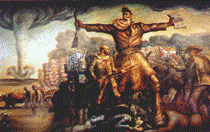History, Department of

James A. Rawley Graduate Conference in the Humanities
Date of this Version
April 2008
Document Type
Article
Abstract
This paper proposes that a cross-tribal sense of belonging, similar to modern conceptions of racism, facilitated the formation of multi-ethnic communities among the Indian populations living to the west of Hudson’s Bay in the eighteenth century.
Based upon observations made over the course of a century by employees of the Hudson’s Bay Company regarding the attitudes held by their Native American trading partners towards the region’s Inuit populations, this paper concludes that Indians living to the west of Hudson’s Bay in the eighteenth century constructed an inclusive trans-Indian sense of identity based, at least in part, on the exclusion of the Inuit “other.” Indian prejudice against the Inuit stretched across the boundaries of dialect and language-family and, within the scope of this manuscript, included Chipewyan, Cree, and Yellowknife Indians. Individual Indian communities An inclusive, trans-Indian identity was perpetually reinforced through trade, cohabitation and marriage, and joint raiding activities by the “in groups,” activities from which the Inuit were excluded. This exclusion was both result and cause of the continual hostility present between Indian and Inuit groups throughout the eighteenth and early nineteenth century.


Comments
Paper presented at the 3rd Annual James A. Rawley Conference in the Humanities — Imagining Communities: People, Places, Meanings. Lincoln, Nebraska, April 12, 2008. Sponsored by the University of Nebraska–Lincoln History Graduate Students’ Association. Copyright © 2008 Strother Roberts.